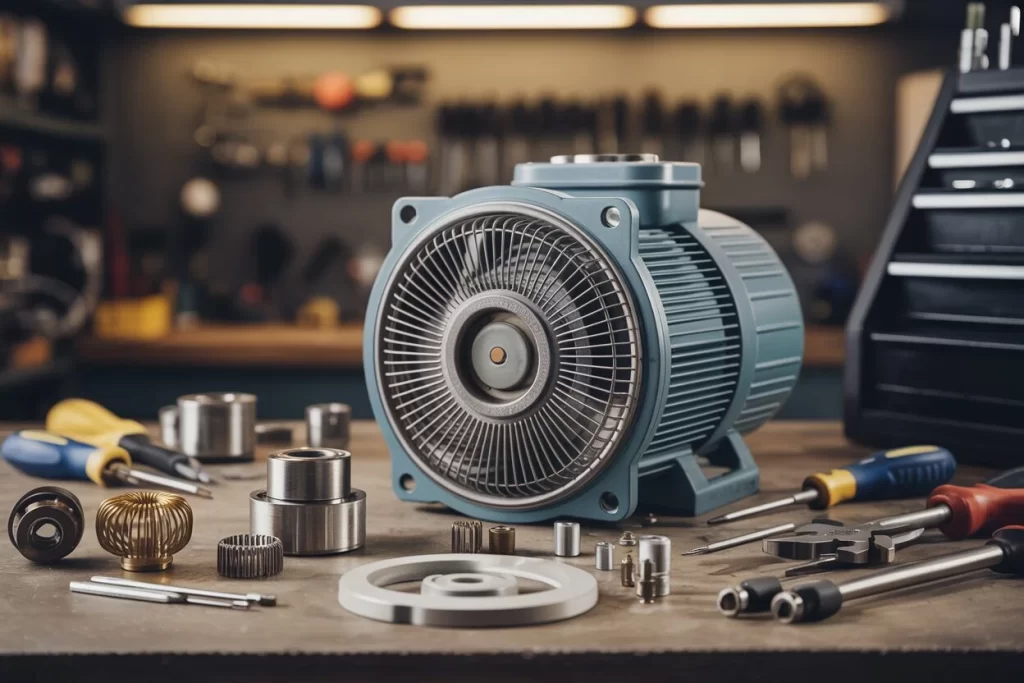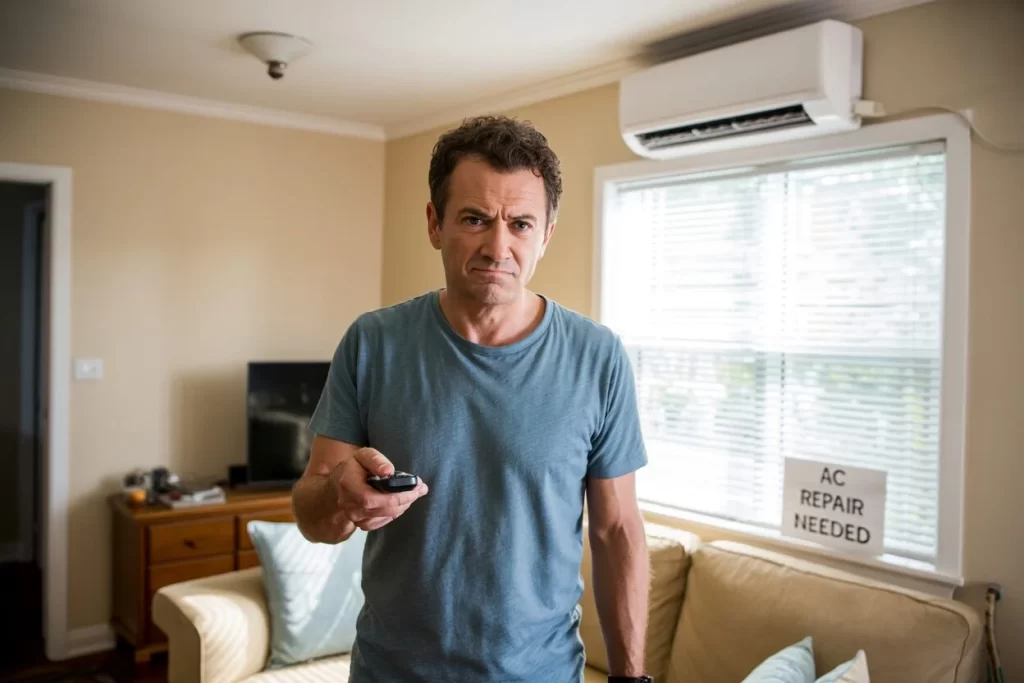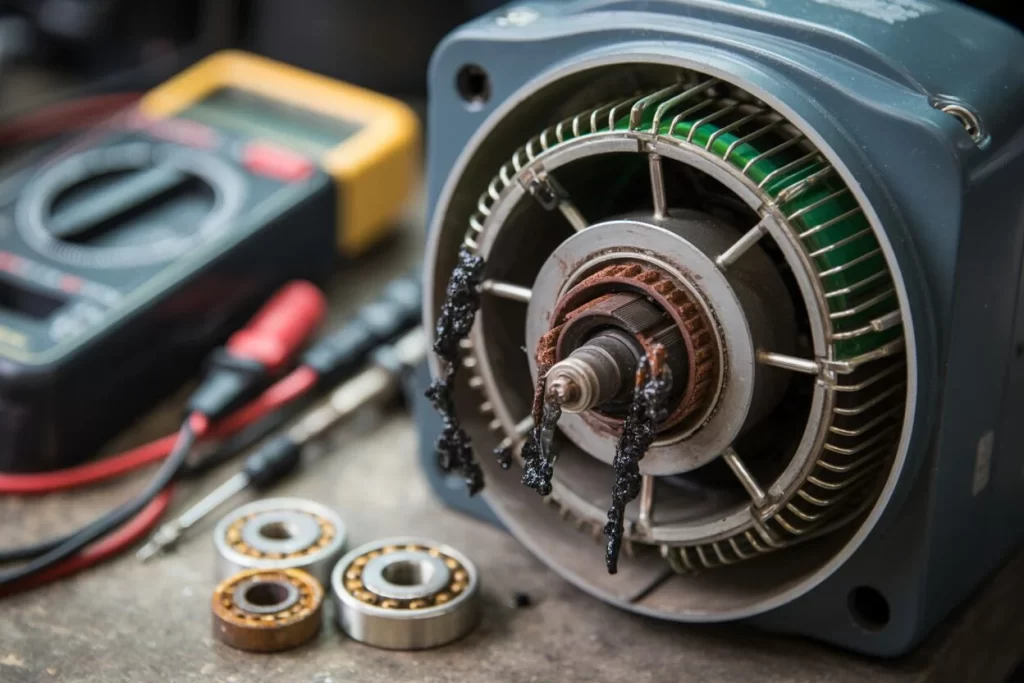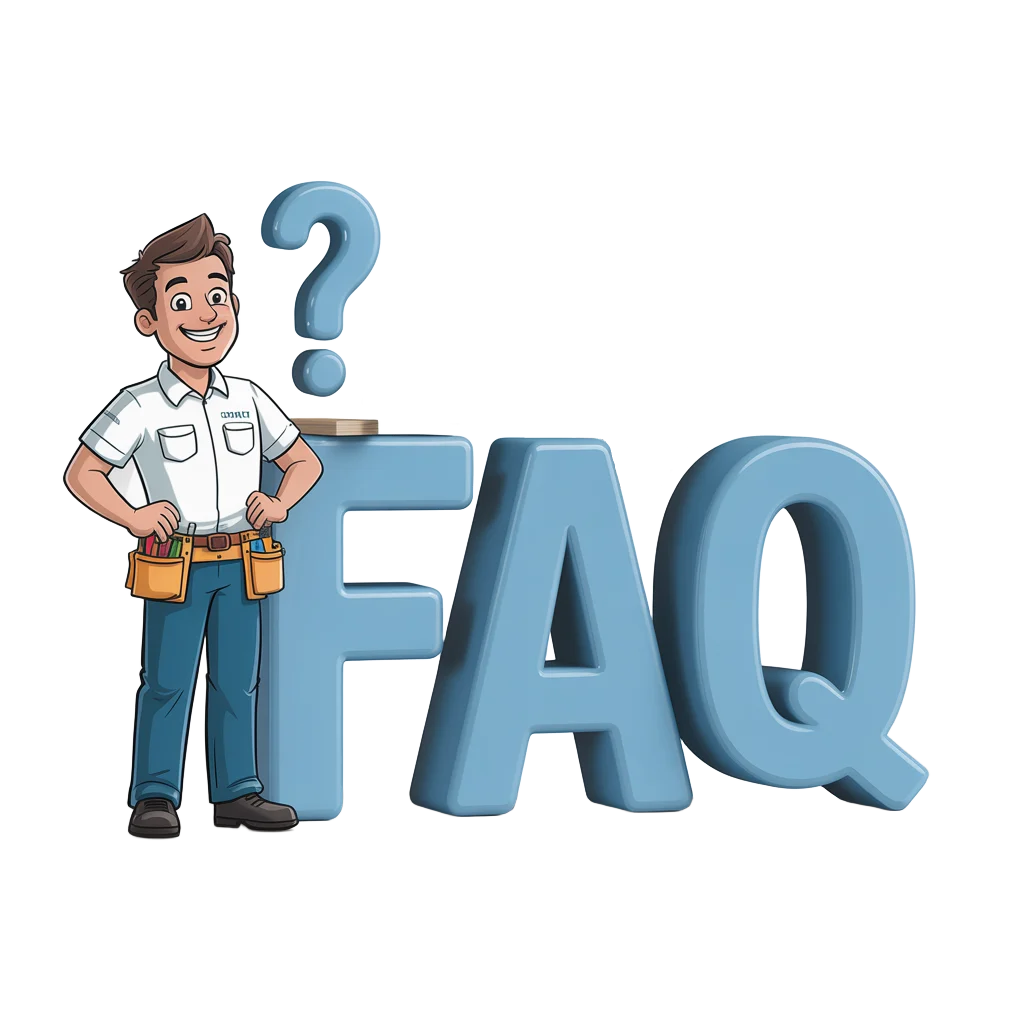AC Fan Motor Problems: Complete Troubleshooting Guide
When your AC fan motor fails, you’re looking at either your indoor blower fan or outdoor condenser fan—both are essential for cooling. Start by checking your circuit breaker for tripped switches, then listen for unusual sounds that signal motor trouble. A failed capacitor, which acts like the motor’s battery, often prevents startup. Look for bulging or leaking capacitors, weak airflow from vents, and burnt wires around connections. Understanding which fan is malfunctioning helps target your troubleshooting efforts more effectively.
Understanding Your AC Fan System
Your AC system has two important fan motors that work like your home’s lungs. The outdoor fan pushes hot air out, and the indoor fan moves cool air through your ducts. These motors run the whole time your AC is cooling your home. They spin at set speeds to keep air moving properly through your system. When a motor has problems, it’s like having trouble breathing. This makes your whole AC system work harder and use more energy.
How Your HVAC System Fan Motor Works
Your air conditioning system needs two fan motors that work together to keep your home cool. The indoor fan pushes cool air through your ducts, and the outdoor fan removes heat from the refrigerant coils. They work as a team – one brings you cool air, the other gets rid of hot air outside. When these motors break down, you’ll get less air flow or warm air from your vents. Knowing how these two fans work together helps you figure out which one is causing your comfort problems.
Reasons Why Your AC Fan is Not Working
When your air conditioner’s fan decides to take an unscheduled break, several common culprits are usually behind the strike. These signs that indicate trouble can help you troubleshoot before calling professionals.
Here are the most common causes when your AC fan is not working:
Each problem has different symptoms, making diagnosis straightforward once you know what to look for.
Indoor vs. Outdoor Fan: Different Diagnoses For Your AC System
Although both indoor and outdoor AC fans serve your cooling system, they operate independently and fail for completely different reasons. When your outdoor unit’s fan is not spinning, you’re likely dealing with a bad capacitor or a damaged AC fan motor from weather exposure. These common causes require air conditioning repair focused on the condenser components. However, indoor fan problems typically stem from clogged filters, blower motor issues, or electrical connections. Think of them as separate engines – one pushes heat out, the other circulates cool air in. Identifying which fan is malfunctioning helps pinpoint the exact repair needed.
Blower Fan Issues Versus Condenser Fan Motor Problems
Distinguishing between blower fan troubles and condenser fan motor problems saves you time, money, and unnecessary frustration during AC breakdowns. Your blower fan sits inside your air handler, circulating air through your home’s vents. When it fails, you’ll notice weak airflow or no air at all. The condenser fan motor lives outside, cooling your compressor. If your AC fan is not spinning outdoors while producing warm air indoors, that’s your condenser fan motor calling for help. Both issues often require motor replacement by an HVAC technician, but knowing which one’s acting up helps communicate the problem clearly.
How A Non-Working Fan Affects Your Entire HVAC System
Your AC system is like a carefully planned dance, and when one fan breaks, it messes up everything. A broken AC fan motor causes problems throughout your whole air conditioning system. If the outdoor fan stops working, heat can’t escape properly. This makes your compressor work too hard and it can overheat. If the indoor fan fails, no air moves through your home. This can freeze your evaporator coils and cause water damage. These problems get worse fast and turn small fixes into big, expensive repairs. That’s why you need a professional HVAC technician to check your system – finding fan problems early saves your whole AC system.
Diagnosing AC Fan Not Working Issues
When your AC fan stops working, you need to check if the problem is inside your house or outside at the condenser unit. This is like checking different parts of your car when it won’t start. Your indoor fan motor and outdoor condenser fan do different jobs, so you need to test them differently to find what is broken. Most fan problems happen in common ways. You can use simple testing steps to find the problem before you call an HVAC technician for AC repair.
When Your Outside AC Fan Stops Running

If your outside AC fan has stopped running, you are dealing with common problems that can stop your condenser unit from cooling. When your AC fan is not working, first check if the outdoor fan gets power. Look for tripped circuit breakers or blown fuses. A bad fan motor often makes strange noises or spins slowly before it stops working completely. To troubleshoot AC problems, check the fan blades for dirt and debris. Look at the capacitor for damage like bulging or leaking, which means it needs to be replaced.
Indoor Fan Motor Troubleshooting Steps
Three main signs show when your indoor fan motor has problems before your home gets too hot. First, you will feel weak air coming from your vents, even when the AC runs all the time. Second, weird grinding or squealing sounds mean the bearings inside the AC fan motor are breaking. Third, your system turns on and off over and over without reaching the temperature you set. These tips work for both indoor blower problems and outdoor AC fan problems. Start by checking your circuit breaker, then look at the air filter for blockages that make the fan motor work too hard.
Outdoor AC Fan Diagnostic Procedures
Why won’t your outdoor AC fan spin when everything else seems fine? Start your outdoor ac diagnostic by checking the circuit breaker – it’s like the system’s main on/off switch. Next, examine the capacitor, a small cylindrical component that jumpstarts your fan motor. If it’s bulging or leaking, you’ve found your culprit. Listen for humming sounds indicating fan motor issues within your ac system. When the fan is not spinning despite power flowing, debris around the blades often blocks movement. These simple checks help pinpoint if you need basic cleaning or professional ac repair services.
Unit Fan Performance Testing Methods
After completing those initial diagnostic checks, you’ll need to perform specific performance tests to confirm what’s actually wrong with your fan motor. Start by checking voltage at the motor terminals—it should match the nameplate specifications. If fan blades are not spinning despite proper voltage, you’ve likely got a seized motor. Test the capacitor with a multimeter; bad readings indicate replacement needed. Watch for excessive amp draw, which signals a malfunctioning fan motor struggling internally. Always check the circuit breaker first though—it’s like your air conditioning unit’s safety valve, protecting against electrical overload.
How to Troubleshoot Your Air Conditioner Fan
When your AC fan stops working, you don’t need to worry or call a repair person right away. You can try several easy steps to fix the problem yourself. Start by checking the electrical connections and look for signs that show what’s wrong with the fan motor. But you also need to know when to stop trying and call an expert instead of doing the work yourself.
Basic DIY Fix Solutions for Fan Problems
Before calling in the professionals, you can tackle several common AC fan problems with basic tools and a methodical approach. Start by checking your air filter—a clogged filter makes your air conditioner work harder than a marathon runner in quicksand. Replace it if it’s dirty. Next, inspect the outdoor unit of your AC for debris blocking the fan blade. Clear away leaves, grass, and other obstructions. If the fan blade appears damaged or the motor won’t start despite these fixes, you’re likely dealing with a bad AC fan motor that requires professional replacement.
Checking Your AC System Electrical Connections
Electrical connections in your AC system work like the nervous system in your body—when one connection fails, the whole operation can shut down. When checking your AC system electrical connections, start by turning off power at the circuit breaker for safety. Look for loose, corroded, or burned wires around the fan motor and capacitor. These connections supply power to your unit’s components. A bad fan motor often stems from faulty wiring rather than the motor itself. Verify your AC gets consistent power by tightening loose connections and cleaning corrosion with a wire brush before calling professionals.
Fan Motor Problems You Can Identify Yourself
After confirming your electrical connections are solid, you can spot several fan motor problems without taking anything apart. Listen for unusual sounds when your AC fan is not working properly—grinding, squealing, or humming indicates internal motor issues. Watch the fan blades carefully; a broken fan will wobble noticeably or spin slower than normal. Notice if your fan stops running intermittently, which often signals capacitor failure. These troubleshooting tips help identify the most common reasons why your AC struggles. If you hear humming but see no movement, that’s typically a seized motor requiring professional replacement.
When to Stop DIY and Call an HVAC Technician

Why risk turning a manageable repair into a dangerous situation or costly mistake? Stop your AC fan motor troubleshooting and call for a professional HVAC assessment when you encounter electrical issues, burning smells, or refrigerant leaks. If your circuit breaker trips repeatedly, the motor hums but won’t start, or you’re dealing with capacitor replacement, it’s time for expert help. These complex problems require specialized tools and training that prevent costly damage. Professional technicians guarantee proper repairs while establishing preventative maintenance schedules that reduce future repair costs and extend your system’s lifespan considerably.
Preventing Future AC Fan Motor Problems

You found out what is wrong with your AC fan motor, but now you need to stop this problem from happening again. Preventing AC fan motor problems is not hard – it just needs regular care and knowing what warning signs to look for. These maintenance steps will keep your outdoor fan running well, help you find problems before they get expensive, and help you decide when to repair or replace your fan motor.
Regular HVAC System Maintenance Tips
While nobody enjoys thinking about HVAC maintenance until something breaks, preventing AC fan motor problems is much easier (and cheaper) than fixing them after they fail. Regular maintenance keeps your system running smoothly and catches issues early. Start with monthly air filter changes – dirty filters force fan motors to work harder, like running uphill instead of on flat ground. Schedule professional maintenance twice yearly for thorough inspections and tune-ups. This preventative maintenance approach monitors system performance and addresses minor problems before they become expensive repairs. Think of it as regular checkups for your AC’s health.
Protecting Your Outdoor Fan from Damage
Your outdoor AC unit stays outside all year, so weather damages it constantly. Rain, hail, flying debris, and sun slowly break down the fan motor. Basic care protects your equipment and reduces repair bills. Keep plants at least two feet away from your AC unit—bushes that grow too close block air and hold moisture. Put a cover on the unit when you’re not using it, but take it off before turning the AC on or it will overheat. Clean the unit regularly to remove debris. When debris builds up, the fan motor works too hard and breaks sooner.
Signs of a Bad AC Fan Motor to Watch For
Your AC fan motor will break down eventually, even if you take good care of it. Watch for warning signs so your whole system doesn’t fail on a hot summer day. A failing condenser fan motor makes strange noises like grinding, squealing, or humming that you haven’t heard before. Your AC will blow warm or hot air instead of cooling your house. A broken fan motor also makes the circuit breaker trip often because it puts too much strain on the electrical system. This problem will get worse if you don’t call a repair person quickly.
When to Replace vs Repair Your Air Conditioner Fan Motor
The decision between repairing or replacing your AC fan motor depends on three key factors: the motor’s age, repair costs, and your system’s overall condition. If your AC unit fan not spinning costs under $300 to fix and your system’s less than ten years old, repair makes sense. However, when repair bills exceed half your air conditioner fan motor’s replacement cost, it’s time to upgrade. A professional HVAC assessment helps determine if frequent repairs will cause your fan to stop working again. Remember, if your AC is not working efficiently overall, replacement often proves more economical long-term.

Frequently Asked Questions
Can I Run My AC if Only One Fan Is Working?
You shouldn’t run your AC with only one fan working. It’ll strain the system, cause overheating, reduce efficiency, and potentially damage other components like the compressor, leading to costly repairs.
How Long Do AC Fan Motors Usually Last Before Needing Replacement?
AC fan motors typically last 10-15 years with proper maintenance. You’ll need replacement sooner if you skip regular tune-ups or live in harsh climates that strain the system constantly.
Is It Safe to Repair an AC Fan Motor Myself?
You shouldn’t repair AC fan motors yourself due to electrical shock risks and potential equipment damage. Professional HVAC technicians have proper tools and expertise to safely diagnose and fix motor issues.
What Warranty Coverage Applies to AC Fan Motor Replacements?
Home warranty coverage for AC fan motor repairs depends on your specific policy terms. You’ll need to check your contract details or contact your warranty provider directly to confirm what’s covered and any applicable deductibles.